
"We didn't realize how harmful chemicals could be until Dr Shi told us in a lecture early this year. We live and depend on the land. It's our mother. But we are doing so much harm to her."
"Dr Shi" is Shi Yan, the main motivator of Shared Harvest, and no stranger to the green and sustainable agriculture movement.
"We feel we are doing a great, great charity for our sons and grandsons," Liu continues. "It's really not about the money."
The village had long ceased making money from its farms and most of the villagers had already gone to the city to find work. CSA is calling them back.
"It's slow and the harvests are comparatively small, and it's more expensive," but Liu says that the village now sees hope on the horizon. In June, the income from paid subscriptions rose to about 50,000 yuan ($8,150), with vegetables from the 5.33 hectares of land selling for 15 yuan per kilogram.
"It means that our farmers get a paycheck that is even better than working in the city," Liu says. More than 10 villagers are now back working on the farms.
"The more people stay back, the more prosperous the local community will be," Shi muses.
Paid subscriptions help shield the farmers from instability and risks.
In spring, there was an outbreak of aphids on the Shared Harvest farms. Soapy water and pepper spray were not enough to kill the bugs, which have become susceptible only to pesticides. Leaf vegetables across the farms were all but wasted.
"We can only make up to the consumers with other options, explain our plights, try harder and wait for recovery," Shi says. If the farms had had no support from Shared Harvest members, they would have a hard time weathering such disasters.
Diversity also helps, and the farmers strike a balance by sectioning up the land and growing different produce, so that "one can make up for the shortage of another."
Laura Johnson Hill, a mother of four, looks forward to the "surprise" mixture every week so long as her family enjoys the food.
"It makes you more creative," she says. "And if you can just smell the tomato, you'll know the difference."
"No need to worry about hormones, genetic modifications or herbicide." Yolanda, a mother-to-be says of her share of the harvests. "You don't even need to peel the vegetables. It's just like when we were young."
"The bottom-line is, organic food tastes good," says Kazuyoshi Fujita, head of Daichi wo Mamorukai (the Association to Preserve the Earth), who started the CSA concept in Japan in mid-1970s. "Consumers would finally vote for that which tastes good. So stop judging by the looks, but go for taste and safety standards."
"CSA may provide what urbanites need," says Wu Wenliang, dean of the school of resources and environment sciences at the China Agricultural University.
"You can trust it because you can always find the producer or farmer and voice any concern. When a farmer is paid in advance, he takes care about the quality. When consumers commit to a membership, there is trust."
Wu expects the model to slowly gather momentum, but admits that it is now mainly supported by those who are able to pay a premium for their vegetables.
Shi also harbors the hope that CSA will take off.
"My statistics from experiences show that every five new members will cleanse one mu (666 square meters) of land, and 1,000 members could very well support an entire rural community," she says.
"I believe CSA will bridge the city and the countryside, so that consumers are more invested and share the risks as well as the rewards of farming, while farmers have a bigger incentive to keep the environment functioning properly."
|
Fresh vegetables, all of which have been paid for upfront, get sent out in weekly boxes to more than 400 Shared Harvest members. |

2013 Chinese New Year |

Hidden dragons, crouching tigers |
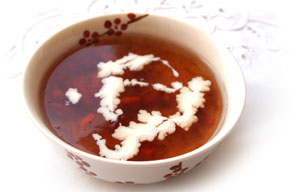
Soap beans, silver ears and peach gum |

Special:Winter Solstice |
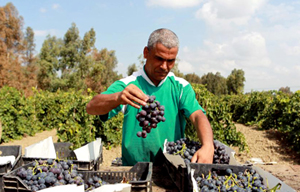
People harvest grapes in Algerian vineyards |
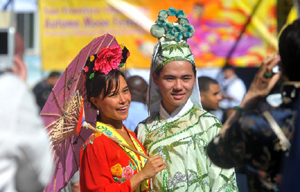
23rd Autumn Moon Festival in San Francisco |
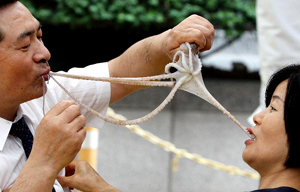
Koreans eat live octopuses during local food festival |
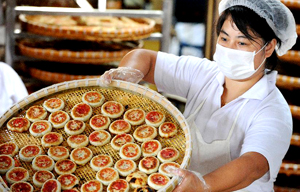
Moon cakes prepared for Mid-Autumn Festival |